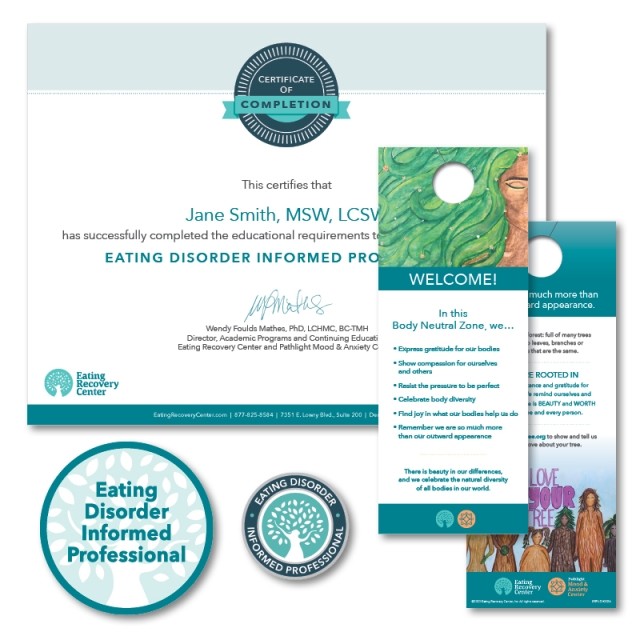
Program Overview
The Eating Disorder Informed Professional Designation is a continuing education program* designed to recognize professionals who have completed eating disorder training to understand the development of eating disorders, specific ways to identify disordered eating and the devastating medical consequences: including bone loss, gastrointestinal disturbances, low heart rate and blood pressure, severe mental health conditions and even death. This designation supports professionals in identifying disordered eating and eating disorder behaviors in order to facilitate early intervention – while also supporting those with diagnosable eating disorders.
An EDIP is informed about how language and culture can trigger disordered eating and eating disorder behaviors in individuals who may be predisposed to these conditions. These professionals have received the necessary education to compassionately support struggling individuals, while simultaneously connecting them to resources and treatment for recovery.
Displaying your EDIP designation demonstrates that you are clinically informed and can provide a stigma-free space where clients can feel heard, understood and validated.


Who Benefits
- Pediatricians and General Pediatricians
- Campus mental health professionals
- School counselors and social workers
- Members of athletic departments
- Educators and administrators
Sessions Include
Eating Disorder and Mental Health Assessment on Campus
1.5 CE/CME Hours
Eating Disorders and disordered eating pose a significant health risk on college campuses, with as many as 25% of students reporting symptoms of eating disorders (NEDA). Research suggests that eating disorders have the best prognosis if treatment is started within the first three years of onset of the disorder. For the traditional college student, this entire three-year period may occur within the context of living on campus, which is why it is critical that college health care providers are trained to not only recognize eating disorders but must also be competent in assessing eating disorder symptoms and behaviors and knowing how to treat them. This presentation will provide education and training on identifying and assessing eating disorders in university counseling and health centers. Additionally, the presenters will include assessment considerations for common comorbid conditions (e.g, depression, anxiety, obsessive compulsive disorder, PTSD, hypothyroid, etc.) This presentation will utilize several case studies to illustrate identifying and assessing students with eating disorders and mental health concerns.
Best Practices for Eating Disorder Care on Campus
1.5 CE/CME Hours
This presentation will discuss best practices for eating disorders care on a college campus. The presenters will address the assessment and diagnosis of eating disorders, evidence based treatments, and the composition of the treatment team. Discussion will include special considerations for working with athletes and referring to a higher level of care. This presentation will discuss best practices for eating disorders care on a college campus. The presenters will address the assessment and diagnosis of eating disorders, evidence based treatments, and the composition of the treatment team. Discussion will include special considerations for working with athletes and referring to a higher level of care.
Motivational Interviewing
1.5 CE/CME Hours
Motivational Interviewing (and by extension Motivational Enhancement Therapy) is an effective technique for creating and fanning the flames of change beginning with our more resistant patients. It is a useful and necessary skill to help our patients determine their personal goals for change that reduces caregiver burnout.
Collaboration and Wrap Around Care
1.5 CE/CME Hours
Given the higher acuity of mental health concerns in students and increased demand for mental health services on campus, many campus counseling centers are looking for additional resources to help them support their students. This presentation will review different types of adjunct and wraparound services that are available, how to assess which service will be most beneficial, and how to partner with these third-party providers to streamline referrals, communication, and treatment transitions. Hear from mental health professionals with experience working in college counseling, outpatient treatment, and higher levels of care about how to optimize relationships with third-party wraparound services to improve mental health for students and alleviate stress and decrease burnout for campus providers.

For athletic departments, we provide education and information specific to college athletes.
This series will review the development, assessment, identification and impact of eating disorders in the collegiate sport environment. The curriculum will provide athletic department staff with skills and tools to support student athletes that may be at risk of an eating disorder. Speakers will also discuss how to facilitate help-seeking for student athletes that exhibit disordered eating, maladaptive exercise or a diagnosable eating disorder and encourage continued recovery in student athletes that are returning to sport after eating disorder treatment.
Athletic Department Sessions Include
Recognizing Eating Disorder Risk in College Athletes
- Identify personal characteristics, risk factors and cultural influences that make some athletes susceptible to the development of an eating disorder
- Focus on language, attitudes, eating and activity behaviors that are indicative of disordered eating that could lead to an eating disorder
- Practice how to initiate a conversation with a student of concern
Introduction to Eating Disorders: ED101
- Recognize signs and symptoms of eating disorders
- Review eating disorder diagnoses
- Discuss assessments for eating disorders and disordered eating
- Apply motivational interviewing to encourage help-seeking in student athletes
Disordered Eating, Eating Disorders and Athletic Performance
- Explain relative energy deficiency (RED-S) and nutritional needs of athletes
- Understand the impact of malnutrition on athletic performance
- Review medical risk and consequences of malnutrition in athletes
Return to Play: Clearing Athletes for Participation in Sport
- Outline medical criteria for safe return to play and the risks of early return
- Evaluate protocols for supporting incoming athletes who have had an identified eating disorder
- Establish guidelines for supporting athletes who are returning to the team after eating disorder treatment
On-Demand Courses
Step 1 - Sign Up
Please use the self-sign-up link and code "EDIP24" to create an account on our CE Portal. If this is your first time accessing our portal, you will receive a confirmation email from ERC and Pathlight Continuing Education Events with a link to log in. If you have an existing account, once you’ve completed the self-sign-up form, you can log directly into your account to access the webinar.
Download our instructional PDF.
Step 2 - Register
*The EDIP designation is not a licensure or certificate program. For more information on formal training and certification as an eating disorder professional, please contact iaedp.
Hide Last Child Layout Div
Anchor Tags
